Political comebacks and returns to private life: What happens to former presidential candidates?
PHOENIX - It's a rather common sight for presidential races in the United States: whoever wins the election will enjoy a lot of media attention as the leader of a major country, while we hear less about the candidate who came up short.
Here's a look at what happens to presidential candidates after they lose their race for the White House.
For the purpose of this article, we only looked at Democrats or Republicans who ran for the presidency. We also excluded those who cannot run again due to term limits.
Returning to their original job
Oftentimes, presidential candidates already have an existing political position when they launch their campaign, and some opt to return to their original job after their White House run failed.
Michael Dukakis
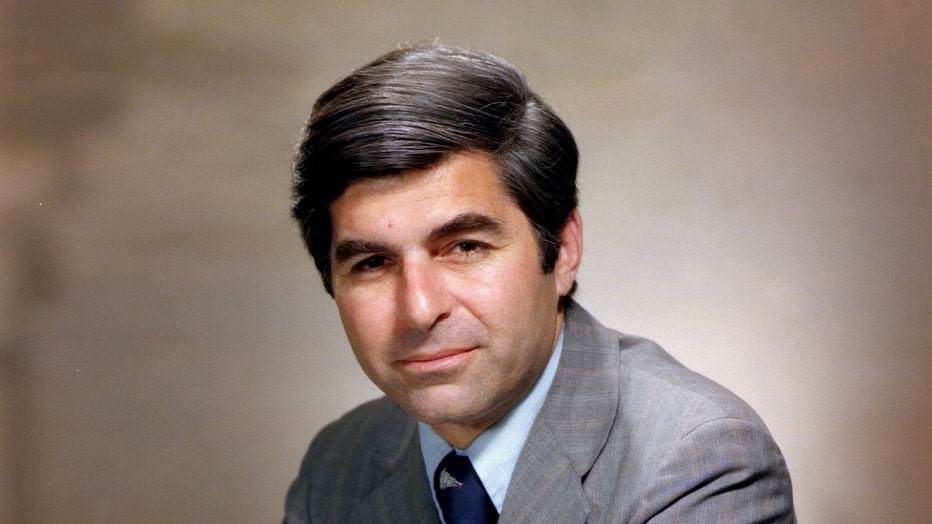
Michael Dukakis (Photo by Bachrach/Getty Images)
Dukakis, per the Encyclopaedia Britannica, was the Democratic presidential candidate for the 1988 presidential election, and ran against the Republican Party candidate, George H. W. Bush. At the time, Bush was the nation's Vice President, and Dukakis was the governor of Massachusetts.
According to the American Presidency Project's page on the 1988 election, Dukakis lost by a rather wide margin in the Electoral College, winning only 111 votes compared to Bush's 426.
A July 1989 article by the Washington Post states that following his defeat, Dukakis returned to his role as governor, and during that time, he had to deal with a state budget deficit and disagreements with legislators. He ultimately decided not to run for another term as governor, and later became a college professor.
Barry Goldwater
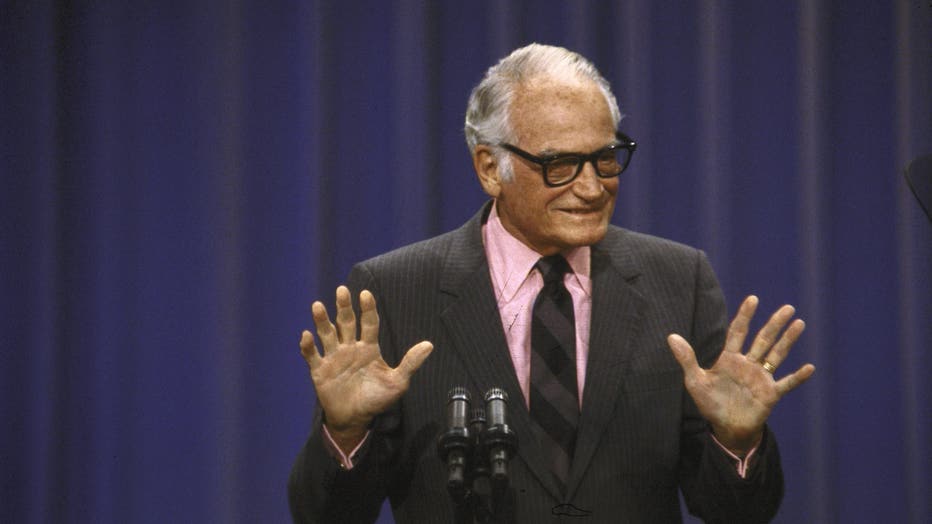
Barry Goldwater (Photo by Steve Northup/Getty Images)
Per his biography on the U.S. Senate website, Barry Goldwater ran for president in 1964. The American Presidency Project's page on that year's election shows the Republican senator ran against Democrat Lyndon Johnson. Johnson was president at the time, having succeeded John F. Kennedy following the latter's assassination in 1963.
In the 1964 election, Goldwater only won 52 electoral votes, and barely won his home state of Arizona with 50.4% of the vote, per the American Presidency Project's website.
His entry in the Encyclopaedia Britannica states that Goldwater won a Senate race in 1968, and was re-elected thereafter until he retired in 1987. He died in Arizona in 1998.
Becoming a private citizen, of sorts
Sometimes, a failed presidential campaign actually turns into a candidate's last-ever election campaign, as they become a private citizen of sorts.
Bob Dole
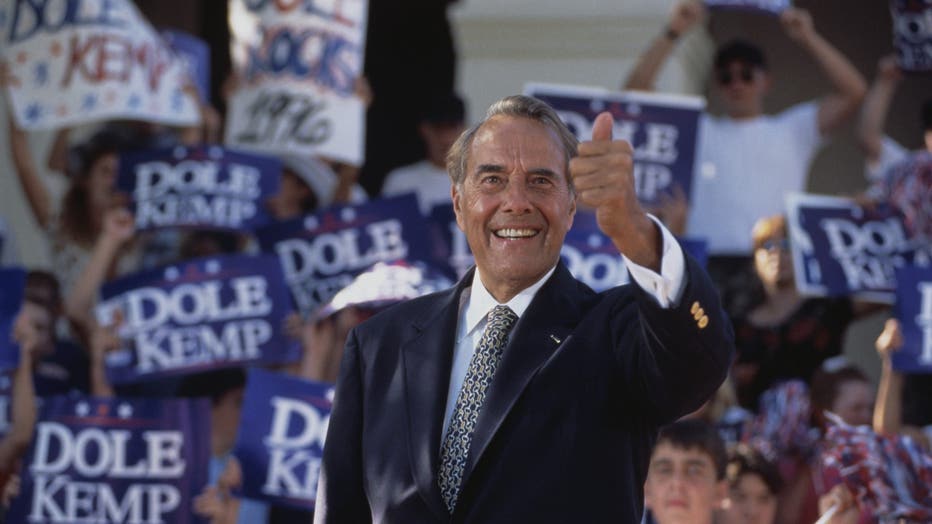
Bob Dole (Photo by Wally McNamee/CORBIS/Corbis via Getty Images)
According to his U.S. Senate profile, Dole represented Kansas in the House of Representatives for eight years, and represented the same state in the senate for over 27. He left the Senate in 1996 to run for the presidency.
Per the American Presidency Project's page on the 1996 election, Dole ran against Democrat Bill Clinton that year. Clinton ultimately won a second term in office, with 379 electoral votes. Dole won 159.
The Associated Press article on Dole's passing in 2021 states that the 1996 campaign for president was Dole's last run for any elected office, and that he returned to private life after that. That didn't mean he was out of the spotlight, however, as he became an elder statesman who helped Bill Clinton get a chemical-weapons treaty passed.
The AP article also states that Dole endeared himself to the public as the self-deprecating pitchman for various products. In a video we found on YouTube, he appeared in a Pepsi commercial with Britney Spears (albeit not together) in 2002.
As mentioned above, Dole passed away in 2021.
Jimmy Carter
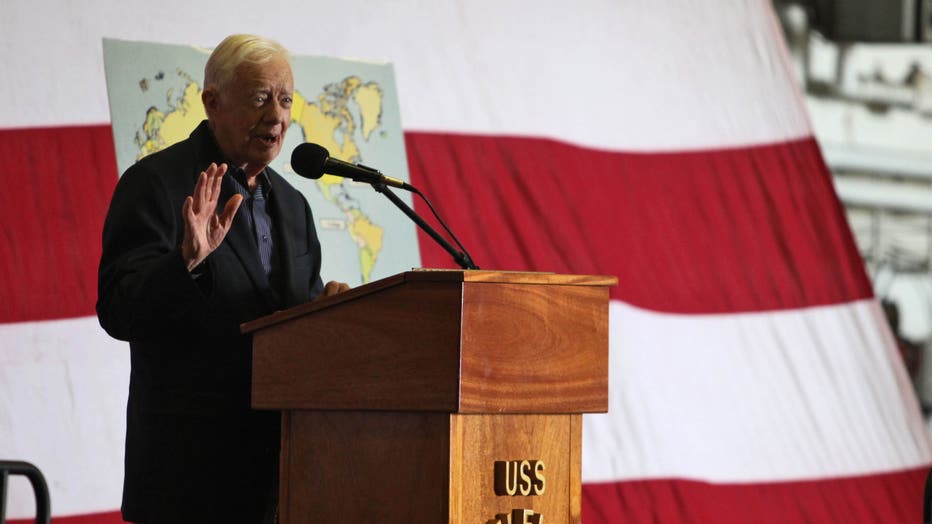
Jimmy Carter (Photo by Lance Cpl. Timothy Childers, 15th Marine Expeditionary Unit)
Jimmy Carter is a name that many Americans know: the Georgian served as president from 1977 to 1981.
Per The American Presidency Project's page on the 1980 election, Carter, who was running for a second term, lost to Republican Ronald Reagan that year, with Reagan securing 489 electoral votes to Carter's 49.
Carter has not sought public office since his failed 1980 presidential campaign, but it's safe to say Carter remained in the spotlight following his return to private life.
Per the AP, Carter's failed re-election bid ultimately paved the way for his decades of global advocacy for democracy, public health and human rights via The Carter Center. He traveled extensively into his 80s and early 90s, including annual trips to build homes with Habitat for Humanity and frequent trips abroad as part of the Carter Center’s election monitoring and its effort to eradicate the Guinea worm parasite in developing countries.
Carter won the Nobel Peace Prize in 2002, and he celebrated his 100th birthday in October 2024.
Serving the country in other roles
Some failed presidential candidates, especially in recent years, have gone on to serve in official roles within the federal government.
John Kerry

Former Secretary of State John Kerry (Photo by Gary Gershoff/Getty Images)
John Kerry was the Democratic Party candidate for president in 2004. At the time, Kerry was a senator from Massachusetts. He ran against Republican President George W. Bush in that year's race, and lost.
The American Presidency Project's page on the 2004 election showed that President Bush won a second term with 286 electoral votes, compared to Kerry's 251.
Following the failed presidential bid, Kerry, according to his entry on Encyclopaedia Britannica, formed a political action committee that became a prominent source of funding for Democratic candidates in subsequent elections. He also endorsed former President Barack Obama's 2008 White House bid, and supported the passage of health care and financial reform bills in 2010. Kerry later served as Secretary of State, and in recent years, he served as a special presidential envoy for climate.
Pete Buttigieg
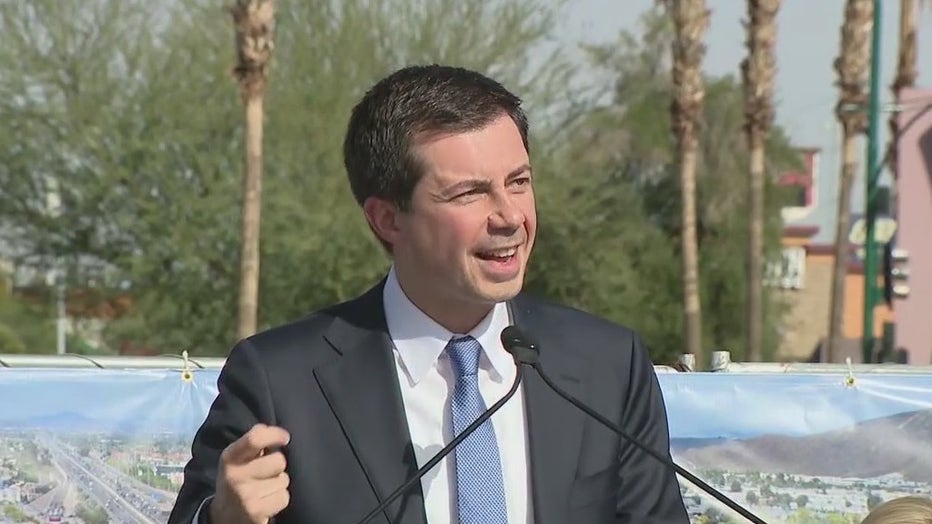
Pete Buttigieg (From File)
Pete Buttigieg's involvement in presidential politics came rather recently: he ran for the Democratic presidential nomination in 2020. At the time, Buttigieg was the mayor of South Bend, Ind.
Following that failed bid for the nomination, Buttigieg served under President Joe Biden as Transportation Secretary.
In an AP article on Buttigieg in 2020, Democratic strategist David Axelrod said "the Pete Buttigieg story isn’t over."
"He’s 38 years old," Axelrod said. "He’s vaulted himself into the national conversation. He obviously has work to do on some things that -- some weaknesses we’ve seen in this election -- but whenever there is a conversation again about Democratic candidates, he’ll be in that conversation. And that’s a remarkable achievement, given where he started a year ago."
Tried again for the White House
It may not be very common, but some failed presidential candidates have made a comeback, and that includes the winner of the 2024 presidential election.
Richard Nixon
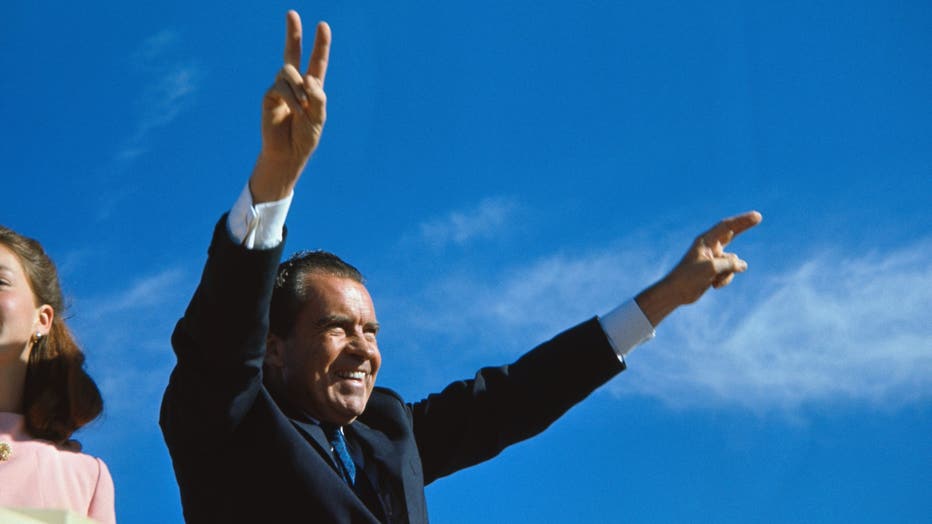
Richard Nixon (Photo by Bettmann/CORBIS/Bettmann Archive)
Richard Nixon is often remembered for the Watergate scandal, a major political scandal that began to unfold, and ultimately led to his downfall during his second term in office. However, his time in the White House came after a failed bid for the presidency.
Per the American Presidency Project's page on the 1960 election, Nixon, who was the nation's vice president at the time, was the GOP's nominee, and faced off against Democrat John F. Kennedy. Kennedy won that year's election with 303 electoral votes. Nixon won 219.
According to his biography on the Richard M. Nixon Presidential Library and Museum's website, Nixon tried to run for California governor following his failed presidential bid, but lost to the Democratic candidate.
Per the biography, Nixon told reporters following the election that "you won't have Nixon to kick around anymore because, gentlemen." Despite telling reporters that it was his "last press conference," Nixon eventually re-entered electoral politics with an ultimately successful 1968 presidential run.
Donald Trump
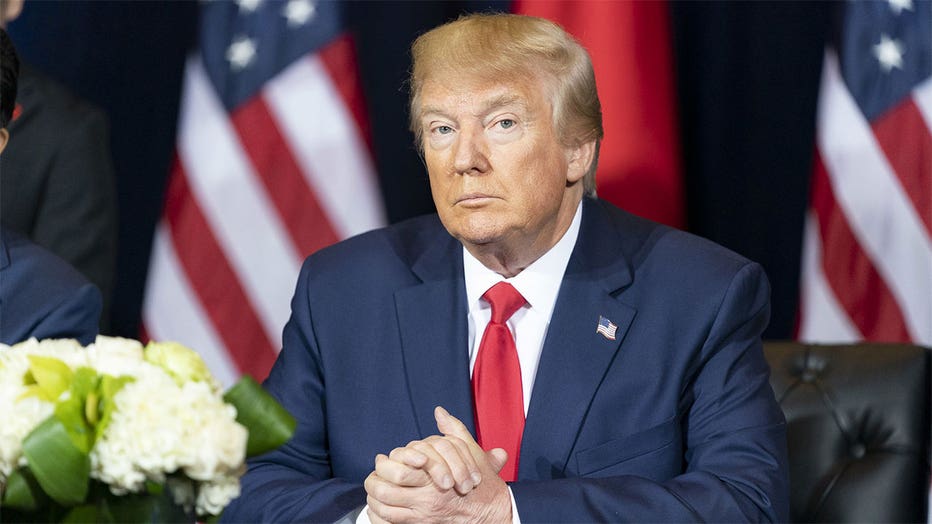
Donald Trump (White House photo)
Donald Trump won the presidency in 2016, and ran for the 2020 election, losing to Democrat Joe Biden. He is projected to win the 2024 election, which means he will become the first person since Grover Cleveland to win non-consecutive presidential terms.
Trump is barred by the U.S. Constitution from running another term in office. Per the National Archives, the 22nd Amendment to the constitution states that "no person shall be elected to the office of the President more than twice."
So, what's next for Kamala Harris?
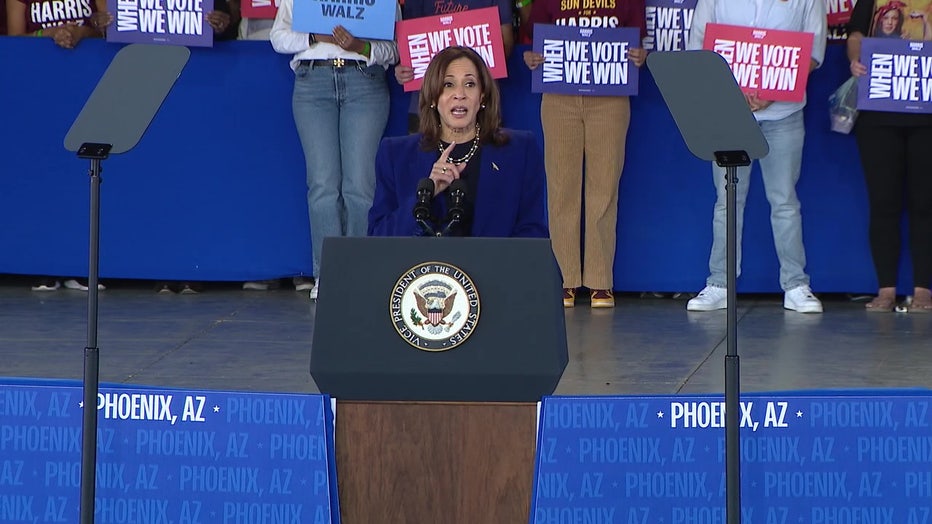
Kamala Harris, during a campaign event in Phoenix.
During her concession speech, Harris encouraged supporters to continue fighting for their vision of the country, saying the battle would continue "in the voting booth, in the courts and in the public square." however, the AP noted that Democrats now face the prospect of picking up the pieces during a second Trump presidency, and it’s unclear what role Harris will play in her party’s future.
Per an article by United Kingdom newspaper The Times, a person who worked with Harris in the California Attorney General's Office said he does not see "any political way forward for Harris."
"That seems to me like the end of a political career, not the beginning of one. This looks like game over. It’s tragic, for her and the country," said Gil Duran.
The article notes that Harris might want to run to succeed Gavin Newsom as California Governor, but one Democratic donor who worked on Harris' campaign team in a 2002 campaign noted some challenges.
"She’s been in the Senate," said Mark Buell. "If she was thinking of coming back to run for governor, the current lieutenant governor is heavily in that race now and has a certain advantage."
"She may have some role in the national party," said San Francisco-based Republican political commentator Richie Greenberg. "At this point she’s going to have to sit back, lick her wounds and see what role she has."
The Source: Information for this article was gathered from the Associated Press, Encyclopaedia Britannica, The Times, the American Presidency Project, the U.S. Senate, and Washington Post.

